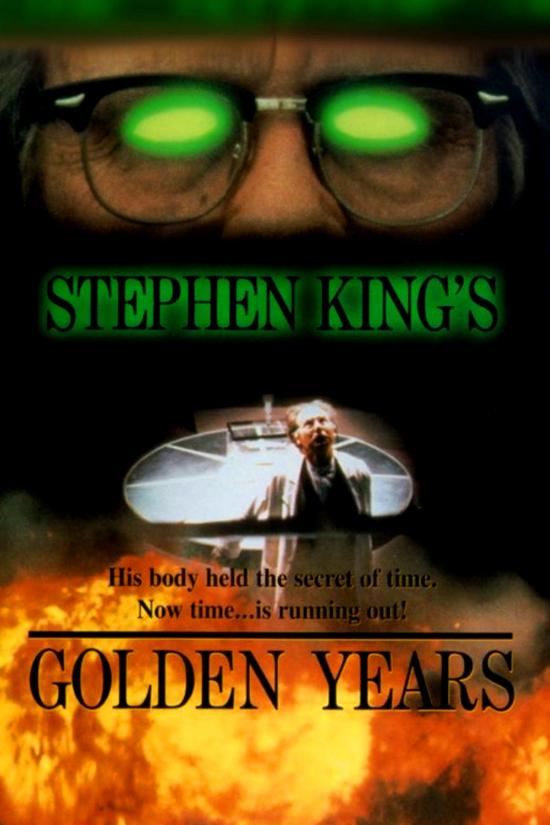King sets out the template for the X-Files to follow.
For a story about a man growing younger, Golden Years somehow manages to make you feel older by the minute. Stephen King’s television experiment, adapted from notes for a potential novel, follows elderly janitor Harlan Williams (Keith Szarabajka) after he’s accidentally exposed to a mysterious form of radiation and begins ageing in reverse. It doesn’t provide the tight dread of It or Salem’s Lot, nor the compact morality plays of Cat’s Eye or Creepshow. Those earlier anthology successes showed that King’s storytelling instincts can work in either mode, the brief and brutal or the sprawling and slow-burn, but Golden Years exposes how precarious that balance is.
The ingredients of a good ’90s paranoid thriller are all present and correct: shadowy government agencies, secret experiments, a blue-collar everyman whose body becomes classified information. The presence of The Shop, King’s occasionally recurring shadow agency from Firestarter, cements this story within his own loosely connected universe; a connection strengthened by a comparison of one character to John Rainbird. That man, who’s deadlier than George C Scott in an eyepatch, is Jude Andrews (R D Call), Golden Years’ coldly efficient antagonist, a moustachioed bureaucrat with the menace of a hitman and the patience of middle management. His pursuit of Harlan provides what little momentum the show can muster, and Call’s flinty performance almost turns procedural villainy into something a bit more interesting.
Keith Szarabajka gives Harlan a stubborn decency; delivering what performance he can beneath decreasing layers of old age makeup and prosthetics and doing everything he can to keep his man from becoming a MacGuffin. Frances Sternhagen as Harlan’s wife Gina has the flinty tenderness of someone who knows life’s bargains are never fair; but its Felicity Huffman’s Terry Spann, the facility’s head of security who breaks ranks to protect the couple, that ends up being the de facto lead of the show. Her vibe now reads as a proto-Scully: pragmatic, empirical, and quietly moral in the middle of institutional murk. Likewise, Ed Lauter’s General Louis Crewes feels like a first sketch of Assistant Director Skinner, a career military man wrestling with loyalty to the system and sympathy for the innocents it endangers. It’s little wonder then that Golden Years ends up feeling like a particularly dull first draft episode of The X-Files, something that might have been created half way through development. In a way, King was fumbling his way towards a television language that hadn’t quite been invented yet and wouldn’t find its niche for a couple more years. If only King had skewered that tone of procedural scepticism, it could have anchored the show more decisively and potentially changed TV pop culture as we know it.
King described Golden Years as a “novel for television,” and that’s exactly how it plays: long on conversational interiority, short on televisual momentum. When the series leans into the unsettling possibilities of rejuvenation, youth as erasure, memory and identity thinning out, you get a sense of the genuine science fiction unease that would have manifested had it been a conventional novel. Mostly, though, the format keeps yanking it back to committee rooms and mission briefings and you can almost sense the medium and the writer negotiating terms in real time. It doesn’t help that King himself only wrote the first three episodes and outlined the last, leaving the rest in the hands of showrunners who, quite frankly, had butterfingers.
The audience and network weren’t kind. The idea was always to segue from the miniseries into a continuing drama, but CBS passed, leaving the broadcast version to stop on an unresolved cliffhanger. Later home-video cuts fiddled with the ending to reconstruct a sense of closure, but even that abrupt happy ending only underlines how carelessly the door had been slammed shut. Ironically, it’s the one aspect in which Golden Years was ahead of its time, foreshadowing Netflix-style cancellations before series had the chance to build their audience and story.
The performances range from passable to pantomime and it’s all so lethargically directed that you struggle to follow the plot not from complexity but from catatonia. If Chris Carter owes Golden Years a debt of inspiration, he probably earned it by managing to stay awake through all seven episodes.











